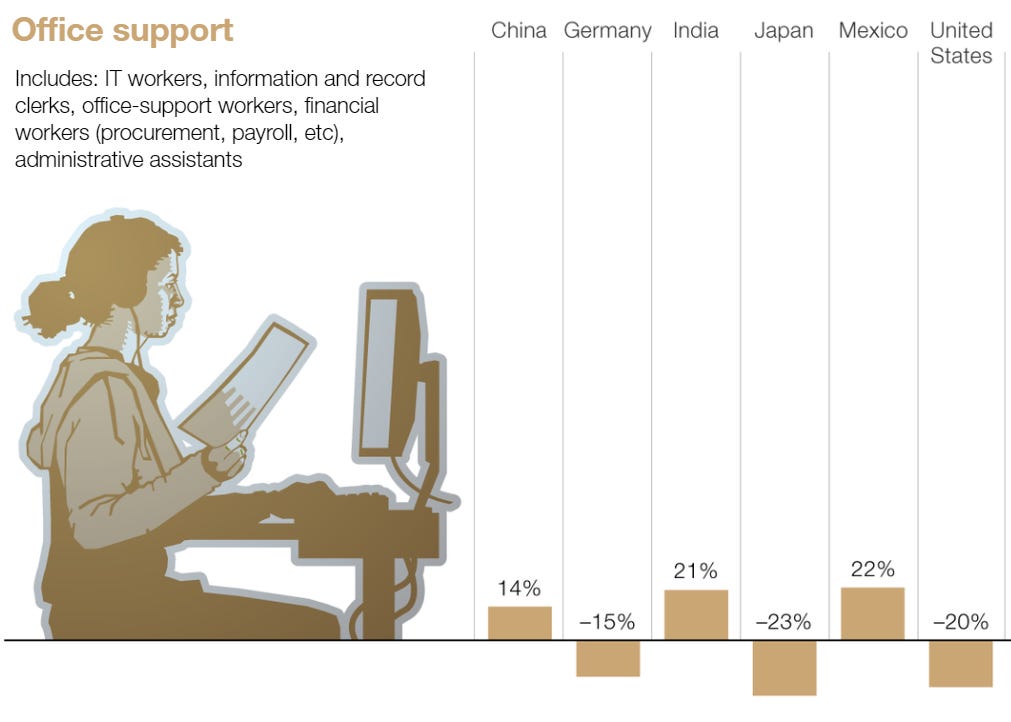On teaching and the knowledge economy
The industry is becoming increasingly generalist and teachers are leaving

This McKinsey report about the future of work makes for interesting reading. In the infographic below, we can see that low-level knowledge and administrative work are disappearing due to automation. We’ve long been warned that this kind of low-level work is under threat. The same report shows teaching to be a growth area, with some notable exceptions, possibly due to economic and population stability in those regions.
But it seems that administrative work in teaching is under no such threat. Rather than alleviate workload or even replace whole tasks, technology seems to have had a multiplying effect on workload. Several factors could explain this. Firstly, there is no serious money in EdTech, which I’ve written about in detail here. A lack of compatibility between systems often means entering data in triplicate. Inefficiencies and clunkiness abound, even with the better systems. Secondly, teachers work at a fixed price, so role-creep costs nothing. Why buy the cow when you get the milk for free?
I recently tweeted asking followers about tasks that it doesn’t really take between 5 and 9 years of education to complete, and I thought I would compile them into human and potentially non-human tasks. Recently the Grattan Institute offered some solutions to teacher workload and their offerings were met with mixed results - everything from, “Ready-to-teach lesson plans? Yes please!” to others who responded as if this affront to their autonomy was akin to taking their firstborn child. Unfortunately, this outcry drowned out some of the less topical ideas they put forward. I hope that by compiling this list, we can start some radical thinking about how to restructure teacher workload so that we can give more time for teachers to do what they’re good at.

Human tasks
Playground duty (yes, it’s a good opportunity for connection but the time cost is about 20 hours a year)
Study and library supervision
Organising excursions and camps
Photocopying, printing, scanning work samples
Book audits, ordering books on the app, laminating, tidying of the bookroom
Report subediting (grammar not content)
Extra-curricular duty of care
Carrying things (too many examples - including furniture - to mention)
Parental care responsibilities like uniform washing, handing out hats, making lunches
Medical, immunisation supervision, and first aid
Cleaning
Exam supervision
Sorting assessment papers
Answering the phone (a kind of triage system could be put in place)
IT resourcing like charging, collecting, storing
Possibly automated tasks
Following up on absences
Following up on missing excursion/event notes
Data entry between systems and applications
The imperative is clear. While unions are mostly pushing for more money for teachers to keep toilet-break records and return lunch boxes to students, they neglect the fact that teachers are highly educated knowledge workers, who are stretched way too thin by their generalist responsibilities. The cry for higher pay is a difficult sell when it’s so hard to directly link it to better student outcomes.
AltSchool in Silicon Valley has seen the value in letting specialist teachers teach, outsourcing all their administration to their head office. In tech, time is money. Employing more administrative staff is cheaper than employing whole teachers (we know that nobody wants to pay teachers more) and poses no timetabling issues. At some point, we may need to ask our elected representatives to lead a radical rethink of teacher work.




Thanks for writing so clearly about the (mostly, unfulfilled) promises and woes of EdTech. The pockets of EdTech that do return profit are - unsurprisingly - the ones that bypass schools altogether!